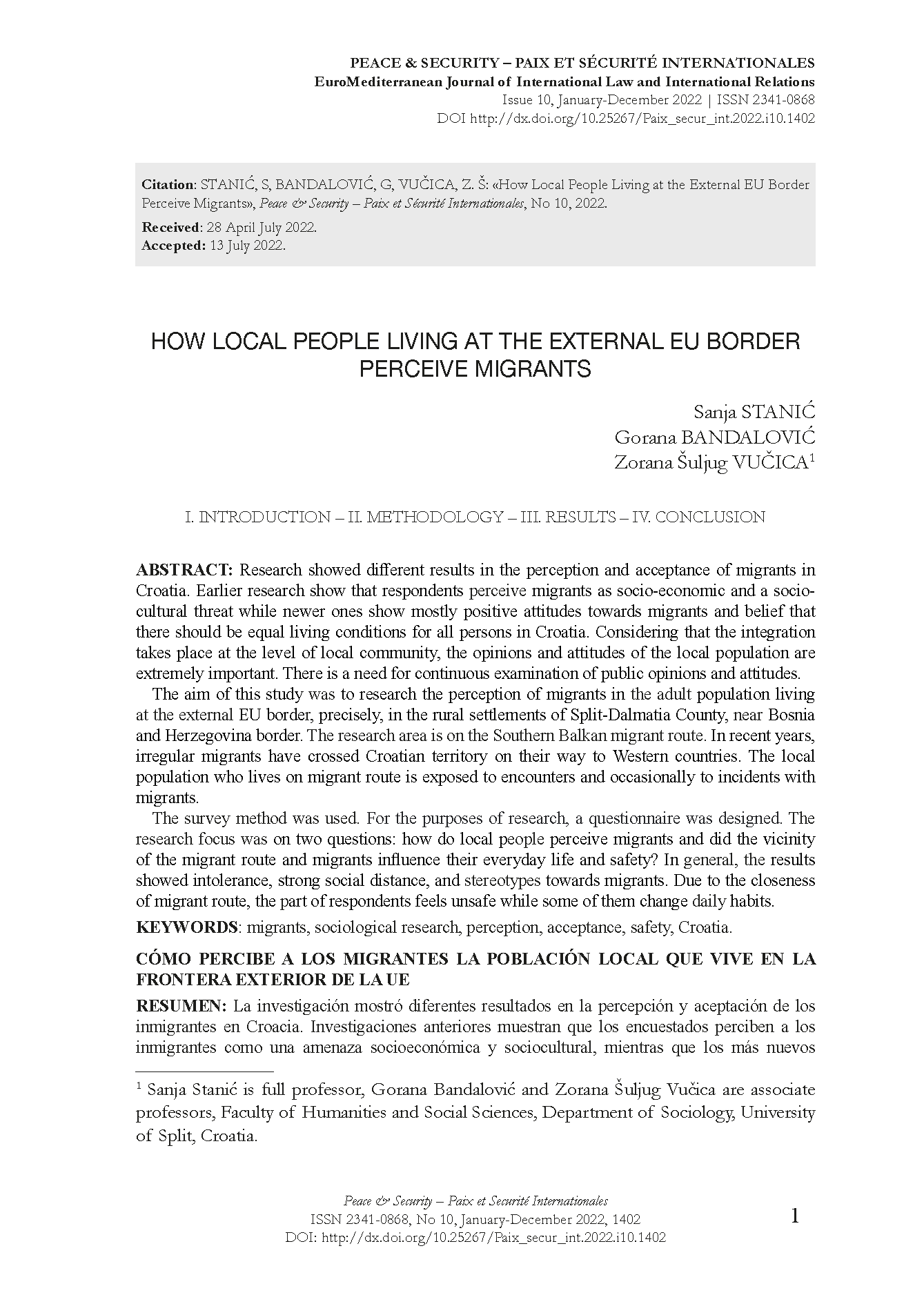How Local People Living at the External EU Border Perceive Migrants
Resumen
CÓMO PERCIBE A LOS MIGRANTES LA POBLACIÓN LOCAL QUE VIVE EN LA FRONTERA EXTERIOR DE LA UE
La investigación mostró diferentes resultados en la percepción y aceptación de los inmigrantes en Croacia. Investigaciones anteriores muestran que los encuestados perciben a los inmigrantes como una amenaza socioeconómica y sociocultural, mientras que los más nuevos muestran actitudes mayoritariamente positivas hacia los inmigrantes y creen que debería haber igualdad de condiciones de vida para todas las personas en Croacia. Teniendo en cuenta que la integración tiene lugar a nivel de la comunidad local, las opiniones y actitudes de la población local son extremadamente importantes. Existe la necesidad de un examen continuo de las opiniones y actitudes públicas.
El objetivo de este estudio fue investigar la percepción de los inmigrantes en la población adulta que vive en la frontera exterior de la UE, precisamente, en los asentamientos rurales del condado de Split-Dalmacia, cerca de la frontera con Bosnia y Herzegovina. El área de investigación se encuentra en la ruta migratoria de los Balcanes Meridionales. En los últimos años, los inmigrantes irregulares han cruzado el territorio croata en su camino hacia los países occidentales. La población local que vive en la ruta migratoria está expuesta a encuentros y ocasionalmente a incidentes con migrantes.
Se utilizó el método de la encuesta. Para efectos de la investigación se diseñó un cuestionario. El enfoque de la investigación se centró en dos preguntas: ¿cómo percibe la población local a los migrantes y la vecindad de la ruta migratoria y los migrantes influyeron en su vida cotidiana y seguridad? En general, los resultados mostraron intolerancia, fuerte distancia social y estereotipos hacia los migrantes. Debido a la cercanía de la ruta del migrante, parte de los encuestados se siente inseguro mientras que algunos de ellos cambian hábitos cotidianos.
Palabras clave
Descargas
Cómo citar
Licencia

Esta obra está bajo una licencia internacional Creative Commons Atribución-NoComercial 4.0.
Copyright
Es condición para la publicación que el autor o autores ceda(n) a la Revista, en exclusiva, los derechos de reproducción. Paix et Sécurité Internationales es una revista que proporciona un acceso abierto inmediato a su contenido totalmente gratuito para lectores como para los investigadores que pretendan publicar en ella, ya que no se realizan cobros por concepto de envío, procesamiento ni publicación. Los usuarios podrán leer, descargar, copiar, distribuir, imprimir, buscar o enlazar el texto completo de los artículos publicados, o utilizarlos para cualquier otro propósito, dentro de la legalidad vigente. Y podrán hacerlo sin coste alguno, y sin necesitad de solicitar permiso al editor a al autor. Todo ello de acuerdo con la definición de acceso abierto de la Iniciativa Acceso Abierto de Budapest.
Citas
AJDUKOVIĆ, D., ČORKALO BIRUŠKI, D., GREGUROVIĆ, M., MATIĆ BOJIĆ, J., ŽUPARIĆ-ILJIĆ, D., Challenges of Integrating Refugees into Croatian Society: Attitudes of Citizens and the Readiness of Local Communities, Edit. Office for Human Rights and Rights of National Minorities of the Government of the Republic of Croatia, Zagreb, 2019.
BARLAI, M., FÄHNRICH, B., GRIESSLER, C., RHOMBERG, M., “The Migrant Crisis: European Perspectives and National Discourses”, Zurich, Berlag, 2017.
BECKERS, K., VAN AELST, P., “Did the European Migrant Crisis Change News Coverage of Immigration? A Longitudinal Analysis of Immigration Television News and the Actors Speaking in It”, Mass Communication and Society, no 6, 2019, pp. 733-755.
BERTOŠA, S., “O toleranciji kroz povijest”, Tabula: časopis Filozofskog fakulteta, Sveučilište Jurja Dobrile u Puli, no 12, 2014, pp. 41-50.
ČAČIĆ-KUMPES, J., GREGUROVIĆ, S., KUMPES, J., “Migration, Integration, and Attitudes towards Immigrants in Croatia”, Croatian Sociological Review, no 3, 2012, pp. 305-336.
CARRERA, S., BLOCKMANS, S., GROS, D., GUILD, E., The EU’s Response to the Refugee Crisis: Taking Stock and Setting Policy Priorities, Edit. Centre for European Policy Studies, Brussels, 2015.
CHOULIARAKI, L., ZABOROWSKI, R., “Voice and community in the refugee crisis: A Content Analysis of News Coverage in Eight European Countries”, International Communication Gazette, no 6-7, 2017, pp. 613-635.
ESTERAJHER, J., “Iskustva zbrinjavanja prognanika i izbjeglica i suvremena izbjegličko-migrantska kriza u Hrvatskoj”, Političke analize: tromjesečnik za hrvatsku i međunarodnu politiku, no 23, 2015, pp. 15-22.
FRANC, R., ŠAKIĆ, V., KALITERNA LIPOVČAN, L., “Perceived Consequences of Immigrations and Attitude towards Immigrants”, Društvena istraživanja: Journal for General Social Issues, no 3, 2010, pp. 421-440.
FRČKO, M., SOLOMUN, D., MIRI, K., Migration and crime: reality and perception, Zagreb Police Research days. Understanding new security challenges. Proceedings of 7th International Scientific and Professional Conference, Edit. Centar za policijska istraživanja, Zagreb, 2020, pp. 283-302.
GUILD, E., COSTELLO, C., GARLICK, M., MORENO-LAX, V., The 2015 Refugee Crisis in the European Union, CEPS Policy Brief, Edit. CEPS, Brussels, 2015.
GREUSSING, E., BOOMGAARDEN, H. G., “Shifting the refugeenarrative? An automated frame analysis of Europe’s 2015 refugee crisis”, Journal of Ethnic and Migration Studies, no 11, 2017, pp. 1749-1774.
GREGUROVIĆ, M., KUTI, S, ŽUPARIĆ-ILJIĆ, D., “Attitudes towards immigrant workers and asylum seekers in Eastern Croatia: dimensions, determinants and differences “, Migration and Ethnic Themes, no 1, 2016, pp. 91-122.
KUMPES, J., “Religiosity and Attitudes towards Immigrants in Croatia”, Migration and Ethnic Themes, no 3, 2018, pp. 275-320.
MALDINI, P., TAKAHASHI, M., “Refugee Crisis and the European Union: Do the Failed Migration and Asylum Policies Indicate a Political and Structural Crisis of European Integration? “, Communication Management Review, no 2, 2017, pp. 54-72.
MEDLOBI, M., ČEPO, D., “Towards refugees and asylum-seekers: a post festum of the so called refugee crisis”, Political Perspectives, no 1-2, 2018, pp. 41-69.
PODDAR, S., “European Migrant Crisis: Financial Burden or Economic Opportunity. Social Impact Research Experience”, 2016, pp. 1-26. Available at: https://repository.upenn.edu/sire/43 (last accessed March 4 2021).
ŠELO-ŠABIĆ, S., BORIĆ, S., At the Gate of Europe: A Report on Refugees on the Western Balkan Route, Edit. Friedrich Ebert Stiftung, Zagreb, 2016.
ŠRAM, Z., “Ethnocentrism, Threat Perception, and Croatian National Identity”, Migration and Ethnic Themes, no 2, 2010, pp. 113–142.
ŽUPARIĆ-ILJIĆ, D., GREGUROVIČ, M., “Stavovi studenata prema tražiteljima azila u Republici Hrvatskoj”, Društvena istraživanja: Journal for General Social Issues, vol.22 no 1, 2013, pp. 41-62.







